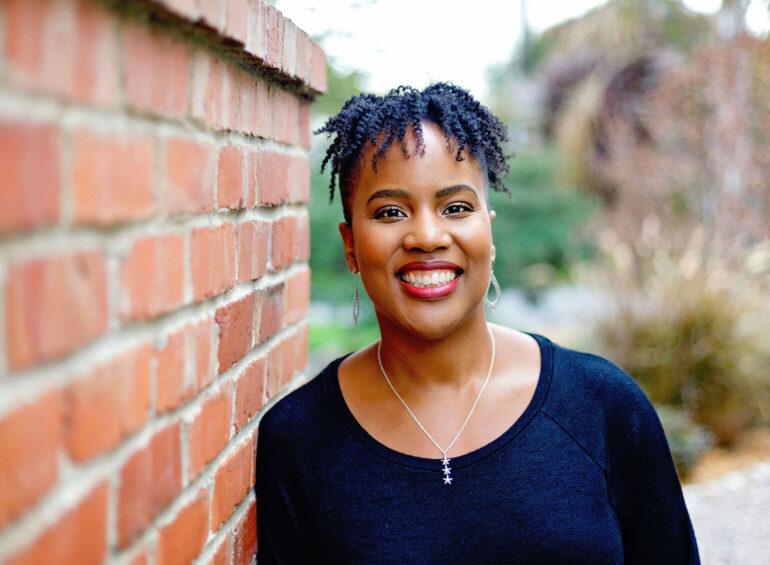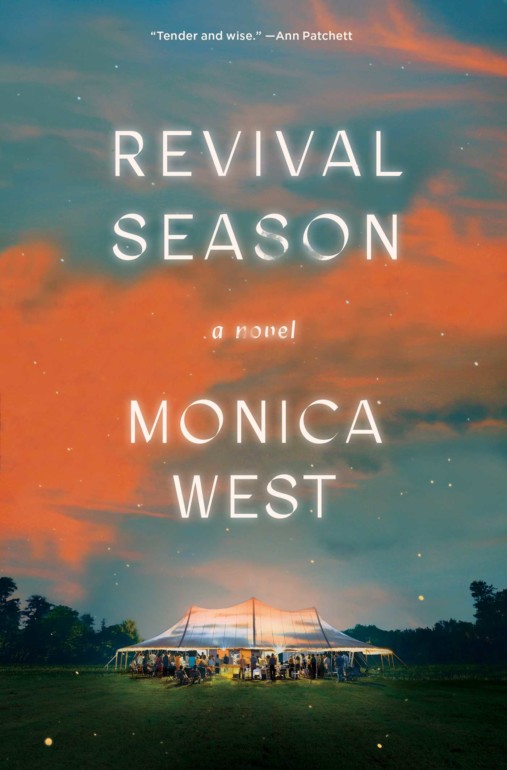Born and raised in Cleveland, Ohio, Monica West is an English teacher and writer with degrees from Duke University and New York University. Her debut novel, Revival Season, offers a compelling snapshot of a Southern, Black, Evangelical community, examining both spiritual awakening and disillusionment, and celebrating both feminism and faith. The central character is 15-year-old Miriam Horton, who accompanies her reverend father as they travel with their family through small Southern towns, holding healing services for those suffering from ailments. Things take a dramatic turn when Miriam witnesses a shocking act of violence, and also discovers she might have powers she didn’t realize.
We spoke to Monica about her debut novel.
What inspired you to write Revival Season?
It was initially inspired by my frustration around gendered power dynamics and patriarchy, but it’s impossible to write a novel about an idea that big. Therefore, I had to locate it in something smaller and more tangible. The church happened to be a convenient place to situate the novel because I’m familiar with the power dynamics of women’s invisibility and male domination in that space. At the same time, issues of power and patriarchy are bigger than the church, so I hope that even people who aren’t religious find something to connect to while reading.
Were there any social themes you were hoping to highlight in writing this novel?
While I was writing, I was thinking about social themes like feminism, patriarchy and power. Religion happened to be a convenient vehicle for writing about these issues, but I don’t think that the book is religious, per se. The religious theme is more about who is allowed to lead the church and how patriarchal structures influence ideas about what leadership means, who is visible, and who can receive recognition. Even though you can find those examples in church, the themes are universal, too. For example, there are similar questions about who we elect to political office (and who we see as electable). In terms of race, my characters are Black because I wanted to highlight the particularities of the Black church and validate a segment of society that often goes unseen. Even as the book centers Black characters and the Black church, larger issues about feminism, power and patriarchy transcend race.
Why did you decide to include a person with a disability in the story?
Representation is important, and I wanted readers who are differently-abled to see themselves centered in a book that showcases their strengths. I also wanted Hannah to be differently-abled because it was important to present a character who never needed healing in a book that is inherently about healing in a religious context. Finally, I wanted to use Hannah to challenge Samuel’s conceptions about his own power and the limitations of his power.
Are there any authors who inspired you to write this book?
Toni Morrison is the most obvious one, because I’ve admired her writing for so long. In addition, this book could never have existed without James Baldwin, particularly Go Tell It on the Mountain. I was also inspired by Barbara Kingsolver’s The Poisonwood Bible and Brit Bennett’s The Mothers.
For more on Better:
- 7 Reasons Why We Love Kamala Harris
- 14 Good Books by Top Authors to Add to Your Summer Reading List
- Jill Wine-Banks Reflects on Watergate, Self-Doubt, and Plans to Turn Memoir into a Movie Starring Katie Holmes
 Jessica Gliddon is the Senior Digital Editor for Make It Better Media Group. An international writer and editor, she has worked on publications in the UK, Dubai and Cape Town. She is a graduate of UC Santa Cruz, and is the former editor of Abu Dhabi’s airline magazine, Etihad Inflight. When she’s not checking out the latest exhibit at SFMOMA or searching out the best places to eat and drink near her home in San Francisco, she volunteers at the Marine Mammal Center in Sausalito.
Jessica Gliddon is the Senior Digital Editor for Make It Better Media Group. An international writer and editor, she has worked on publications in the UK, Dubai and Cape Town. She is a graduate of UC Santa Cruz, and is the former editor of Abu Dhabi’s airline magazine, Etihad Inflight. When she’s not checking out the latest exhibit at SFMOMA or searching out the best places to eat and drink near her home in San Francisco, she volunteers at the Marine Mammal Center in Sausalito.


